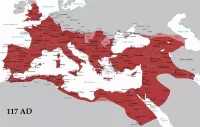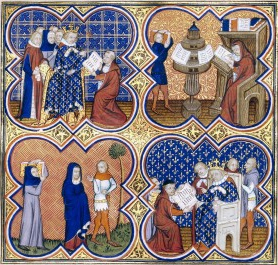Translation is conveying the meaning of a text from one language (source) into another (target) using an equivalent text. A key distinction exists between translation and interpreting, with translation specifically referring to the process that occurs after written text is available within a language community.
1901: Bernard Shaw's Preface
In 1901, Bernard Shaw expressed his desire for Shakespeare to have written prefaces to his plays, highlighting the importance of interpretation in understanding literary works.
1903: Mark Twain Publishes Back-Translation
In 1903, Mark Twain published his back-translation of a French translation of his short story, "The Celebrated Jumping Frog of Calaveras County", in a volume that included the original English version, the French translation, and a history of the story.
1903: Muhammad Abduh Visited Herbert Spencer
In 1903, Muhammad Abduh, an admirer of Darwin, visited Herbert Spencer at his home in Brighton. Abduh found Spencer's view of society as an organism with its own laws of evolution paralleled his own ideas.
1905: Death of Muhammad Abduh
In 1905, Muhammad Abduh, a prominent liberal Islamic thinker and Egypt's chief mufti, passed away.
1908: Newspapers and Periodicals Founded in Egypt
By 1908, over six hundred newspapers and periodicals had been established in Egypt, marking a significant expansion of available information.
1921: Conrad Translates Winawer's Play
In 1921, Joseph Conrad attempted to translate Bruno Winawer's Polish play, The Book of Job, into English but struggled due to his limited contact with spoken Polish, resulting in missed nuances.
1924: Death of Lin Shu
In 1924, Lin Shu, a renowned Chinese man of letters who rendered Western classics into Chinese with the help of Wang Shouchang, passed away.
1936: Quran Translated into 102 Languages
As of 1936, the Quran had been translated into at least 102 languages, despite the Islamic world's ambivalence about translating it from the original Arabic.
1943: Higgins on the Lord's Prayer
In 1943, A.J.B. Higgins demonstrated that both the understanding and text of the devotional verse "lead us not into temptation" underwent considerable changes among the earliest Christian authors.
1946: Pound's Advice to Merwin
In 1946, Ezra Pound advised W.S. Merwin that translation is the best teacher.
1959: Jakobson Declares Poetry Untranslatable
In 1959, Roman Jakobson stated in his paper "On Linguistic Aspects of Translation" that poetry is by definition untranslatable.
1964: Nabokov's Translation of Eugene Onegin
In 1964, Vladimir Nabokov rendered his English translation of Alexander Pushkin's Eugene Onegin in prose, considering rhymed, metrical poetry to be untranslatable.
1986: Publication of Don Quixote by Kathy Acker
In 1986, Kathy Acker’s novel Don Quixote was published. The novel features a translative writing that highlights discomforts of the interlingual and translingual encounters and literary translation as a creative practice.
1988: Publication of Empire of Dreams
In 1988, Giannina Braschi released Empire of Dreams, the first book in her trilogy of experimental works.
1997: Le Ton beau de Marot Published
In 1997, Douglas Hofstadter argued in his book Le Ton beau de Marot that a good translation of a poem must convey its literal meaning, form, and structure.
1998: Publication of Yo-Yo Boing!
In 1998, Giannina Braschi published Yo-Yo Boing!, part of her trilogy that addresses translation through loose translations of dramatic, poetic, and philosophical writings.
1998: Publication of Yo-Yo Boing! by Giannina Braschi
In 1998, Giannina Braschi’s novel Yo-Yo Boing! was published. The novel features a translative writing that highlights discomforts of the interlingual and translingual encounters and literary translation as a creative practice.
1999: Hofstadter Publishes Verse Translation of Eugene Onegin
In 1999, Douglas Hofstadter published his own verse translation of Eugene Onegin, opposing Nabokov's prose translation.
2000: Sumerian Epic of Gilgamesh
Around 2000 BCE, partial translations of the Sumerian Epic of Gilgamesh were made into Southwest Asian languages during the second millennium BCE.
2005: Survey of Slovene Translators
A 2005 survey revealed that 89% of professional Slovene translators translate into their second language, typically English, which highlights instances where translation occurs into a non-native language due to language needs and availability.
2010: Web-Based Human Translation Popularity
As of 2010, web-based human translation has been gaining popularity by providing relatively fast and accurate translation of various types of documents, while machine translation tools like Google Translate and Babel Fish also exist.
2011: Publication of United States of Banana
In 2011, Giannina Braschi published United States of Banana, completing her trilogy that examines translation through Caribbean, Latin American, and Nuyorican Spanish expressions.
2014: Women in Translation Campaign
In 2014, Meytal Radzinski launched the Women in Translation campaign to address the gender imbalance in literary translation into English, where more male writers were being translated than female writers.
2015: Oregon Shakespeare Festival Commissions Translation
In 2015, the Oregon Shakespeare Festival commissioned professional translation of the entire Shakespeare canon into contemporary vernacular English.
2017: Emily Wilson's Translation of Homer's Odyssey
In 2017, Emily Wilson released her translation of Homer's Odyssey, aiming to reveal the morals of its time and place and inviting consideration of the differences and similarities with modern values.
2018: Machine Translation Limitations
As of 2018, Mark Polizzotti argued that machine translation by tools like Google Translate is unlikely to replace human translators soon due to the inability of machines to grasp nuance and connotation.
2019: Shakespeare Canon Premiered Off-Off-Broadway
In 2019, the translated Shakespeare canon was premiered in a month-long series of staged readings off-off-Broadway.
Mentioned in this timeline
The United States of America is a federal republic located...

Google LLC is a multinational technology company specializing in online...

Books are a means of storing information as text or...

An empire is a political structure consisting of a dominant...
Oregon is a state in the Pacific Northwest region of...
Trending

12 minutes ago Cavaliers defeat Hornets 118-113: Game recap and key takeaways from the match.
12 minutes ago Vaccination Requirements and Measles Prevention in Cabo San Lucas and La Paz
13 minutes ago Cason Wallace Secures Four Steals in Thunder's Victory: A Promising NBA Performance.
1 day ago Roman Anthony expected as Red Sox leadoff hitter in 2026, lineup prediction

13 minutes ago Isaiah Hartenstein showcases passing skills, removed from injury report, fills stat sheet.
13 minutes ago Sadie Sink and Noah Jupe Star in Romeo & Juliet West End Production.
Popular

Jesse Jackson is an American civil rights activist politician and...

Barack Obama the th U S President - was the...

Bernie Sanders is a prominent American politician currently serving as...

Michael Joseph Jackson the King of Pop was a highly...

Ken Paxton is an American politician and lawyer serving as...
WWE Raw a professional wrestling television program by WWE airs...










